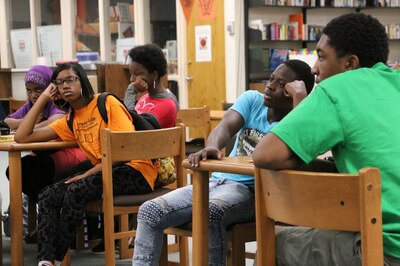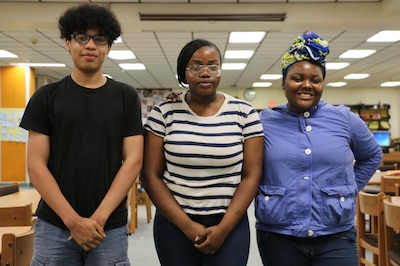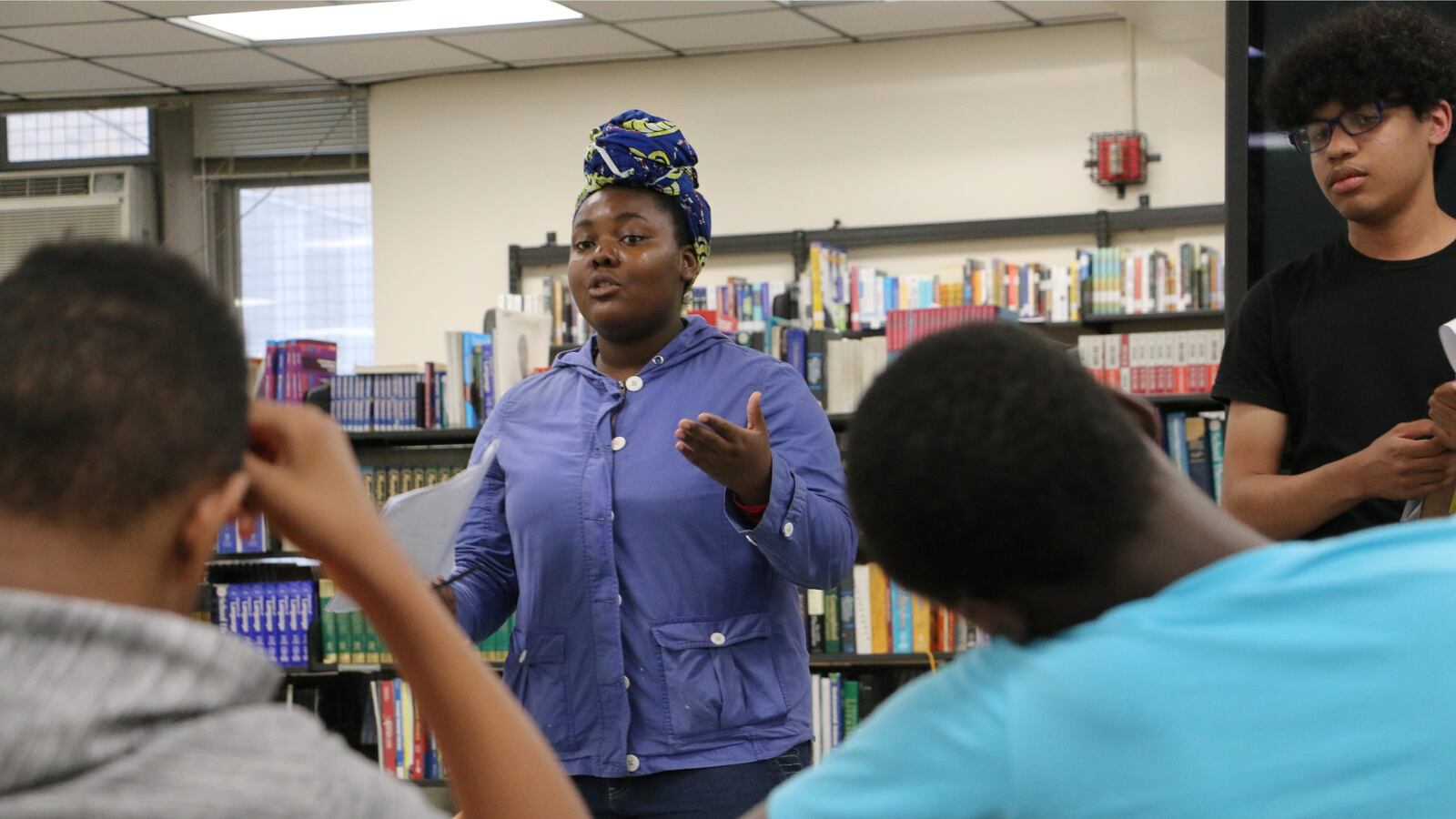Though technically on summer break, the leaders of the Newark Students Union arrived promptly Wednesday morning at the Weequahic High School library to speak at the school’s summer “bridge” program, which is designed to ease incoming ninth-graders’ transition to high school. Their objective: Recruit new members.
Three years ago, the student union attracted national attention when its members occupied the district’s headquarters and helped stage a citywide school walkout that drew thousands of students into the streets. They were protesting the policies of a state-appointed superintendent, who resigned shortly thereafter, and joining calls for the state to return control of Newark’s schools to the local school board, which happened this February.
With those victories notched, the Newark Students Union is trying to recast its mission from attacking state policies to proposing solutions in partnership with Newark’s elected board and newly chosen superintendent. Still, they plan to call out local officials who fall short — constructive criticism that NSU co-leader Bradley Gonmiah likened to a friend telling you your breath stinks.
“Your best friend is supposed to be real with you,” said Gonmiah, a senior at Science Park High School, to the incoming Weequahic students. “Now that they’re close to home,” he said, referring to board members and the district leadership, “we should talk to them and actually have an ability to make change.”
The Newark Students Union was founded in 2012, shortly after the state appointed Cami Anderson, a former New York City school official, to push through aggressive changes bankrolled by $100 million from Facebook founder Mark Zuckerberg. The changes, which included school closures, principal layoffs, and a switch from neighborhood schools to a lottery-based enrollment system, were carried out with little warning or public input, outraging many families.

As tensions escalated, NSU mobilized and went on the attack. Its members shut down a board meeting and in Feb. 2015, staged a four-day sit-in in the district’s main office, taking turns napping on couches and eating donated pancakes until Anderson agreed to meet with them. A few months later, the union was again on the frontlines, as students walked out of class and into the streets, shutting down a busy intersection.
After helping to force Anderson’s exit and speeding the district’s return to local control, NSU’s leaders graduated, and the group went dormant. Then last year, Gonmiah got the idea to revive the union. He had become increasingly interested in district policy after getting involved in a campaign to change the admissions policies at Science Park, the highly selective magnet school he attends. He began to see a connection between his school’s disproportionately large number of white students and its cutting-edge facilities.
“I got enraged,” he said.
As he discussed the idea with fellow student activists, including Azé Williams, a junior at Science Park, they determined that the student union needed a new approach better suited to the new era of local control. They decided to focus more on policy proposals than protests, which is what the original NSU was best known for.
“It has that reputation of rebellious teenagers who are just trying to get out of school,” said Williams. “They’re not going to take us seriously if we just continue to protest and not actually sit down and talk about the solutions to our problems.”
A rebooted NSU held its first meeting on Feb. 1, the day the state handed back authority to Newark’s school board, and came up with several proposals. The union, whose meetings usually attract about 10 students from a half-dozen schools, wants full voting privileges for the board’s student representative, who currently serves in a solely advisory capacity. The NSU is also lobbying for a program that would allow high schoolers to mentor younger students and encourage under-represented groups to apply to magnet schools. Gonmiah has floated the ideas at school board meetings, where he is regularly one of the few students in attendance.
The current NSU members also met with the new superintendent, Roger León, a Newark native and former principal, who they said has been receptive to their input. And, in an effort to promote their expanded mission of “civic engagement” while also recruiting new members, the NSU leaders asked principals for permission to speak at their summer bridge programs. Weequahic was their first stop.

About 20 ninth-graders attended the weeklong program, which began Monday and was more summer camp than summer school. They took personality tests, went scurrying through the Art Deco building on a scavenger hunt, and learned the school’s fight song. On Wednesday, they built contraptions out of straws and cotton to prevent dropped eggs from cracking — a team-building exercise that also stretched their problem-solving muscles — and came up with intricate handshakes.
“Yesterday, we said that we’re a family now,” said Vice Principal Natica Brown, who heads up the summer program, to the students. “In order to be a family, you have to be able to greet your family.”
During the NSU presentation, the students listened respectfully as Gonmiah, holding a clipboard against his black T-shirt, recounted the group’s history. But when Williams asked how the school system could be improved, the floodgates opened.
Better school lunches, air-conditioned classrooms, lessons that connect to the real world, the rising high schoolers suggested. Why had the district shut down some of their neighborhood schools and never replaced them, others wanted to know. And why had some of their middle schools offered almost no instruction in social studies or science?
“How are you supposed to apply to Science Park High School if you didn’t have science in seventh grade?” Gonmiah asked.
When the discussion turned to a “Student Bill of Rights” that NSU is crafting, one young woman said that students need a platform to speak their minds.
“That’s what the Newark Students Union does,” Williams said. “But you have to participate.”
After the presentation, Vice Principal Brown said NSU’s message of civic activism aligns with the school’s. She recalled how Weequahic students organized a panel discussion this year on issues of racial justice raised by the film “Black Panther,” and the student council negotiated an exception to the school’s cell-phone ban — students with good grades and behavior can now use their phones during lunch.
“Our students definitely have a voice,” she said. “And I always encourage them to follow it.”
Nearby, a half-dozen students sat around a table snacking on chips and fretting about the fast-approaching start of high school. Their anxieties included getting lost on the way to class, being surrounded by “tall people,” and an ominous-sounding tradition called “Freshmen Friday,” which they had heard older siblings whisper about.
“I’m low-key scared,” said Sabriya Roberts, who attended BRICK Peshine Academy. Her fellow Pehsine alum, Dreon Servil, agreed.
“It’s going to be a whole different ballpark,” he said.
They were encouraged, however, by the morning’s older visitors. They weren’t sure if they would join the student union, but it gave them hope to imagine one day influencing the decisions that shape their lives.
“To be able to get a position to voice your opinion, to have the power to change the way adults think,” Servil said, “that’s beautiful.”

